

17 buscadores para estudiantes e investigadores. Cuando se hace una investigación, el investigador requiere conocer aquello que, con anterioridad, se ha escrito sobre el tema que le ocupa; debe partir de la idea de que eso que a él le interesa ya ha sido abordado por otros investigadores desde otro enfoque con otra metodología o desde ciertos conceptos particulares; por lo tanto debe mínimamente saber qué se ha dicho y cómo se ha investigado acerca de su tema. Hoy, la Editorial UN comparte con la #ComunidadUN los 17 buscadores más sobresalientes para encontrar fuentes de información académica de artículos, revistas e investigaciones científicas.
Recuerde que en la actualidad, enormes cantidades de información están disponibles en bibliotecas virtuales y en lo que hoy se conoce como la nube. Varios de los recursos se pueden descargar y compartir. Esperamos que este post sea de gran utilidad para sus labores académicas e investigativas relacionadas con la universidad. 1. 2. Field Rankings at IDEAS: Cognitive & Behavioural Economics.
This page shows one of the many rankings computed with RePEc data.
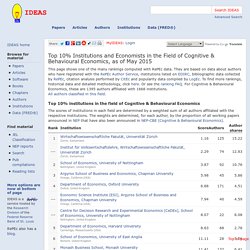
They are based on data about authors who have registered with the RePEc Author Service, institutions listed on EDIRC, bibliographic data collected by RePEc, citation analysis performed by CitEc and popularity data compiled by LogEc. To find more rankings, historical data and detailed methodology, click here. Or see the ranking FAQ. MSc Management Science (Operational Research) MSc Management Science (Decision Sciences) - taughtProgrammes2015. About the MSc programme The MSc Management Science is a one-year programme which provides students with both the knowledge and experience needed to apply management science techniques and methods at the highest decision-making levels in organisations.
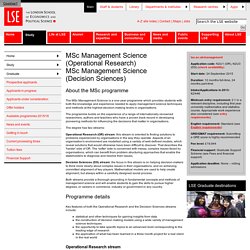
The programme builds on the experience of a range of internationally renowned researchers, authors and teachers who have a proven track record in developing pioneering methods for influencing the decisions that matter in organisations. The degree has two streams: Operational Research (OR) stream: this stream is oriented to finding solutions to problems experienced by organisations in the way they operate. Aspects of an organisation's environment are modelled using a variety of well-defined models, which reveal solutions that would otherwise have been difficult to discover. Programme details Key features of both the Operational Research and the Decision Sciences streams include:
Postgraduate Programs in Behavioral Science. Postgraduate Programs in Behavioral Science. Behavioural Economics. Overview.
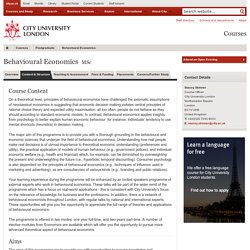
Behavioural Economics. Overview Course overview.
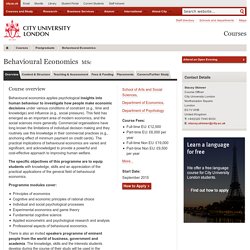
Research Master in Social and Behavioral Sciences. Are you an excellent student and interested in conducting scientific research in the social and behavioral sciences?
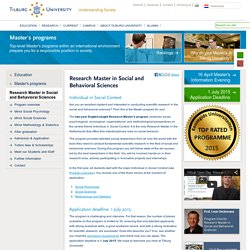
Then this is the Master program for you! The two-year English-taught Research Master's program combines social, psychological, sociological, organizational, and methodological perspectives on the central theme Individual in Social Context. Master's programme in Behavioural Science (Research) Master 1 Economie & psychologie. Field : EconomieProgramme : Economie et psychologieSpecialisation : Economie & psychologie This cursus is open to students from all countries attracted by research on economic behavior, with a bi-disciplinary approach from psychology and economics.
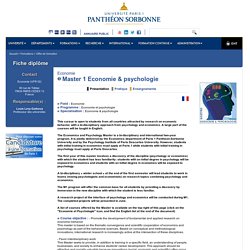
A large part of the courses will be taught in English. Master 1 Economie & psychologie. Master (track) Economics: Behavioural Economics and Game Theory. The Behavioural Economics & Game Theory track in the Economics Master's programme focuses on the psychology of economic behaviour.
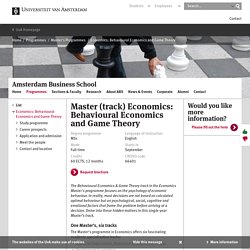
In reality, most decisions are not based on calculated optimal behaviour but on psychological, social, cognitive and emotional factors that frame the problem before arriving at a decision. Master's programme in Behavioural Science (Research) Research Master in Social and Behavioral Sciences. Behavioural Economics. EC907: Quantitative Methods: Econometrics A (for MSc Behavioural and Economic Science - Economics Track) The aim of the module is to give students a good grounding in maths, statistics and modern econometric techniques.
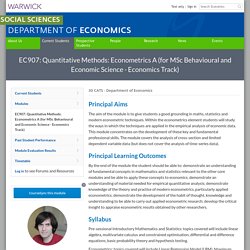
Within the econometrics element students will study the ways in which the techniques are applied in the empirical analysis of economic data. This module concentrates on the development of these key and fundamental professional skills. The module covers the analysis of cross-section and limited dependent variable data (but does not cover the analysis of time-series data). Pre-sessional Introductory Mathematics and Statistics: topics covered will include linear algebra, multivariate calculus and constrained optimisation, differential and difference equations, basic probability theory and hypothesis testing. Time Allowed: 2 Hours. Previous exam papers can be found in the University’s past papers archive. Postgraduate Programs in Behavioral Science. Stirling Behavioural Science Blog : List of Behavioral Economics Masters Programs in Europe. Dan Ariely on Behavioral Economics and Avoiding Krispy Kreme.
By Jeff Calareso Dan Ariely has a Ph.D. in Cognitive Psychology from the University of North Carolina and a Ph.D. in Business Administration from Duke University.
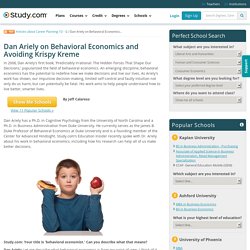
He currently serves as the James B. Duke Professor of Behavioral Economics at Duke University and is a founding member of the Center for Advanced Hindsight. Study.com's Education Insider recently spoke with Dr. Ariely about his work in behavioral economics, including how his research can help all of us make better decisions. Study.com: Your title is 'behavioral economist.' Dan Ariely: Let me describe what behavioral economics is from my point of view. Now, the difference comes from the fact that the observation of how people actually behave often doesn't fit this idea that people are perfectly rational.
I don't care if good ideas come from sociology or anthropology or literature or philosophy. Top 10 Behavioral Economics Graduate Programs for the Cream of the Crop. Behavioral economics is a field in economics encompassing interdisciplinary areas with concerns about financial/monetary decisions created by people and groups that are different from what they have predicted.
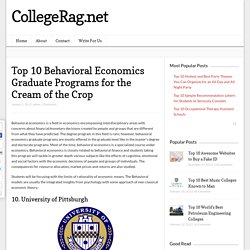
The degree program in this field is rare; however, behavioral economics graduate programs are mostly offered in the graduate level like in the master’s degree and doctorate programs. Most of the time, behavioral economics is a specialized course under economics. Behavioral economics is closely related to behavioral finance and students taking this program will tackle in greater depth various subjects like the effects of cognitive, emotional and social factors with the economic decisions of people and groups of individuals.
The consequences for resource allocation, market prices and returns are also studied. Students will be focusing with the limits of rationality of economic means. 10. 9. 8. PhD Program. Full-Time Course of Study Chicago Booth's PhD Program is a full-time course of study. Most students take five years to complete degree requirements and defend their dissertations. Students begin active research at an early stage and work closely with faculty throughout the program. They are also quickly drawn into the school’s intellectual environment by participating in workshops, where the work of fellow researchers is vigorously discussed and debated. As with the other Booth degree programs, the PhD curriculum is highly flexible.
The World's Best Behavioral Economics Reading List.